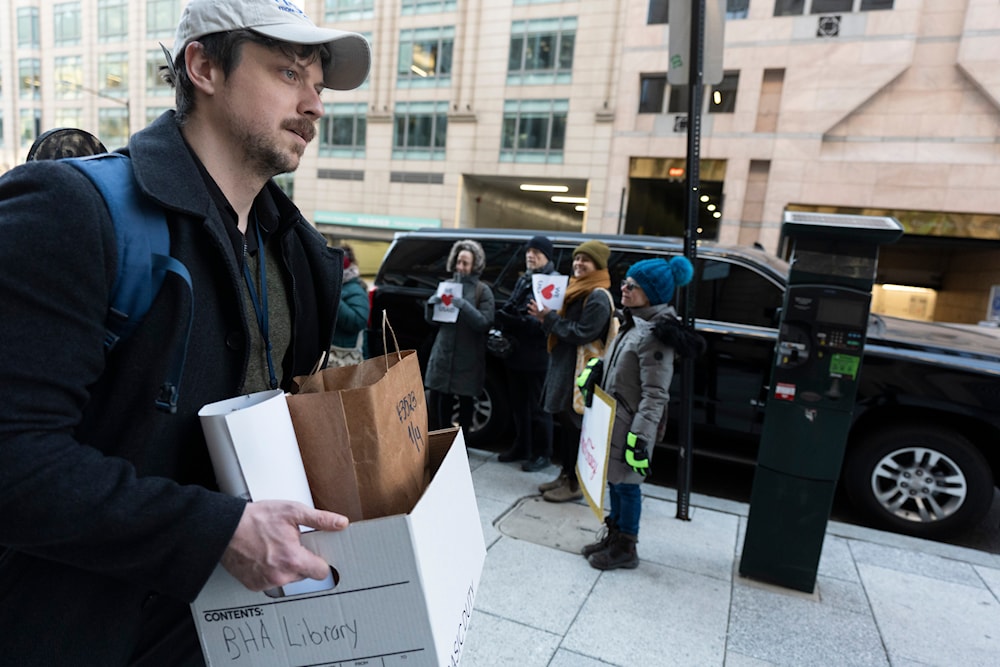USAID staff instructed to get rid of classified documents: Report
Officials have launched a massive effort to destroy classified documents, utilizing shredders and "burn bags".
-

A United States Agency for International Development worker carries personal belongings after retrieving them from the USAID's Bureau of Humanitarian Affairs office in Washington, Friday, February 21, 2025, in Washington. (AP)
Officials at the US Agency for International Development (USAID) have initiated a large-scale destruction of classified documents at their headquarters in Washington, DC, according to an internal email obtained by The Guardian.
The process, which involves shredders and "burn bags," is taking place at the Ronald Reagan Building, as per the report.
The email, sent by Acting USAID Secretary Erica Y. Carr, provides specific instructions for clearing "classified safes and personnel documents" using shredding and "burn bags" labeled "SECRET" throughout the day on Tuesday.
"Shred as many documents first, and reserve the burn bags for when the shredder becomes unavailable or needs a break," Carr wrote, offering detailed guidance on sealing and labeling the burn bags properly.
The timing of this document purge coincides with the effective dismantling of USAID, following the Trump administration’s efforts to overhaul the agency through the so-called "Department of Government Efficiency" (DOGE), led by billionaire Elon Musk. Tasked with drastically reducing federal jobs and spending, Musk’s oversight has triggered significant upheaval across government agencies, with USAID among the hardest hit.
Why it matters
As DOGE's restructuring slashes funding, halts projects, and shuts down initiatives worldwide, there has been an outcry from USAID employees and the international development sector, warning of dire consequences for vulnerable populations.
Ordinarily, when federal agencies undergo dissolution or restructuring, records are transferred to successor agencies or the National Archives and Records Administration (NARA) under the Federal Records Act (FRA). A reminder was even issued during the US withdrawal from Afghanistan in 2021 to ensure the "lawful handling of sensitive documents."
However, concerns have arisen over compliance with the FRA, which prohibits the destruction of government records before their designated retention period—typically at least three years. Critics warn that the mass disposal of documents could erase crucial evidence for ongoing Freedom of Information Act (FOIA) requests and future oversight investigations.
USAID’s Office of the Inspector General previously launched an investigation into the agency’s oversight of Musk’s Starlink terminals sent to Ukraine’s government. Additionally, Democratic senators from the Foreign Relations Committee sent a letter in February to Secretary of State Marco Rubio, seeking answers about Doge’s access to USAID headquarters and records—though they did not explicitly address potential document destruction.
Whether proper records management protocols are being followed remains unclear, raising concerns that essential documents may be permanently lost.
"If you need additional burn bags or Sharpie markers, please let me or the SEC InfoSec Team know," Carr wrote in the email.
USAID; a tool of political influence?
While the Trump administration has gone after USAID over wasteful spending of American taxpayer dollars, this does not come without historical precedent. The agency has repeatedly faced allegations of covert activities and political interference in several countries over the years as in Cuba, in the ZunZuneo Project, Bolivia, through support for opposition groups, Russia, for alleged economic reform through the Harvard Institute for International Development, Brazil, through influence on political reforms, and Peru, in a forced sterilization campaign.
In an interview for #AlMayadeen, Margaret Kimberley, Executive Editor and Senior Columnist at Black Agenda Report, described USAID as a dual-purpose agency; providing aid while acting as an arm of US intelligence to serve its geopolitical interests.
— Al Mayadeen English (@MayadeenEnglish) February 5, 2025
Citing Syria as a prime… pic.twitter.com/WMkF5nrOWA
The agency’s critics argue that it often oversteps its mandate, engaging in activities that serve political rather than humanitarian goals. They point to instances of alleged wasteful spending and covert operations as evidence of systemic issues within the agency.
Read more: Trump promotes ethnic cleansing of Palestinians via 'take over' plot

 4 Min Read
4 Min Read








